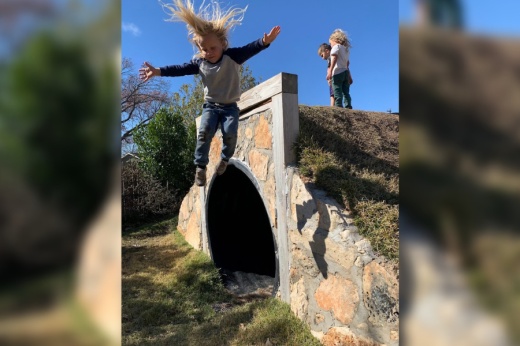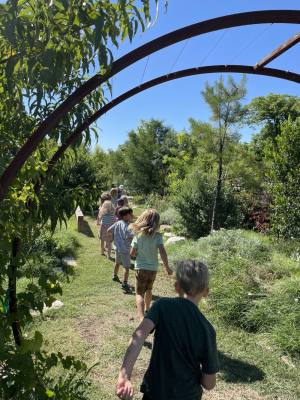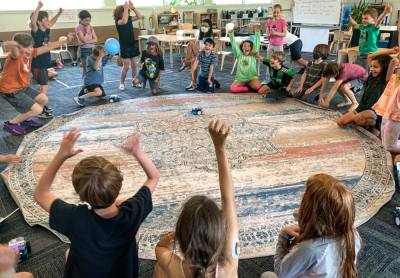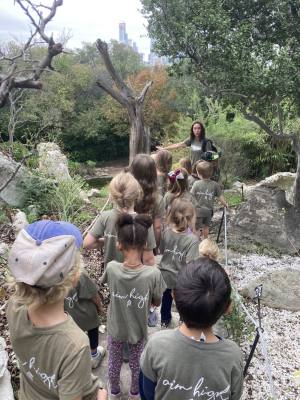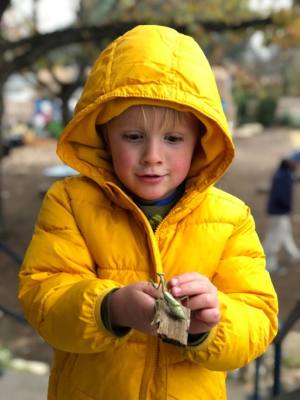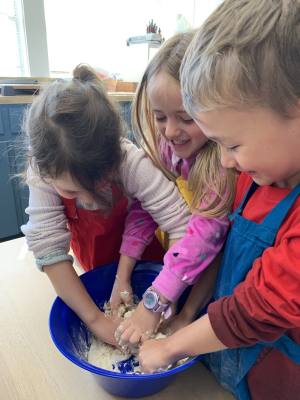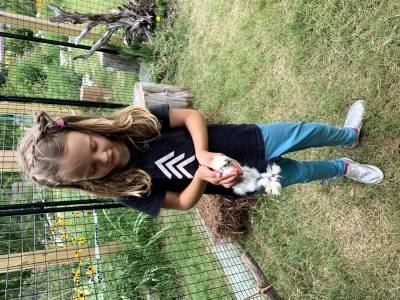For young learners at Ascent Academy, each day is filled with wonder, curiosity and adventure as they explore the world around them—but developing grit through unique challenges, conflict and failure is their true guide to knowledge and purpose.
Ascent learners call each other “fellow travelers,” each on a path to find and chase their dreams in life. They spend their days mastering core skills, connecting through self-directed play, problem solving real-life issues and discovering what sparks their inner passion.
Newcomers may be surprised to discover the inquisitive, innovative and daring children have no teachers, do not take tests and do not receive letter grades. Instead, they have embarked on a Hero’s Journey, the founding ideology of Ascent’s self-guided syllabus and Socratic discussions.
“What we see is a need for a space where young people learn to think critically, can adapt, have confidence in their decision-making process, and are ultimately problem solvers and curious humans,” co-founder Samantha Jansky said. “The world demands that more than just an understanding of facts.”
At Ascent, learners undergo a rigorous, self-paced curriculum in reading, writing, science and mathematics. Socratic guides—who only ask questions–promote analytical thinking through open-ended discussions, and growth is measured through reflection.
“The framework they use to make decisions, work through conflicts and face challenges is that they’re on a Hero’s Journey,” Jansky said. “The hero faces massive failures, but then gets back up, tries again and enters into a new world, changed. The hero then uses that change to start again and bring their gifts into the world.”
Embarking on a Hero’s Journey
Each child enrolled at Ascent is empowered with the philosophy of a Hero’s Mindset, which propels them to find a calling they are passionate about, learn from failure and find solutions in problems.
“We define a hero as someone who sees opportunity in challenges, takes responsibility for their choices and gets back up after failing, but they don’t blame others or make excuses,” Jansky said.
Located at 5701 Cameron Road, Austin, Ascent has two studios: Spark, for children ages 4-6, and Discovery, for ages 7-11. The Maria Montessori-inspired spaces are artfully filled with colorful materials and eclectic objects that kindle curiosity.
Heroes in Spark spend their mornings immersed in the robust learning environment, using their senses to explore elements in the room that inspire them. Operating under the belief that curiosity is innate, Ascent staff create a space for it to flourish.
“If they have the space and the freedom to follow their curiosity, and they have people around them who uplift and encourage it, and who wonder alongside them, then it just grows,” Jansky said.
In the afternoons, Spark learners venture outside for “loose parts play,” an imaginative, experimental playtime free of limitation or instruction. Materials like large barrels, metal 50-gallon drums, planks and ladders of various sizes, milk crates and tarps can be used however they see fit on the property’s vast lawn. The possibilities are endless—but the beauty is in the children making the decisions for themselves.
Travelers on a Quest
Discovery heroes spend their mornings aiming to reach self-set goals on rigorous, adaptable software programs, which are constantly presenting new problems and fresh strategies to solve them.
“They’ve set their own path and work towards mastery, and so they don’t move on to the next level in a subject until they’ve fully grasped the concept,” Jansky said. “Their progress is not based on a teacher-delivered letter grade, which sets us apart in many ways.”
Their afternoons are dedicated to deep-diving into Quests, hands-on projects that engross them in real-life adventures such as entrepreneurship and architecture. Each Quest has a multitude of steps with an end goal in mind like starting a business or designing a structure.
“Our Quests actually put them in the shoes of the heroes in different callings, so they get to explore potential fields,” Jansky said.
During the Entrepreneurship Quest, learners complete steps like mastering unit economics, creating a brand and conducting market research, which culminates in a children’s business fair with real customers. If a product generates low sales, learners use their Hero’s Mindset to assess the misjudgment, reframe their problem and use it as a tool for success.
“Every Quest has its own public exhibition. At the end of every six weeks, there’s a possibility of a real-world, public failure,” Jansky said. “It’s a beautiful display of their learning ... It’s very honest, and it’s powerful to see them go through the process of showing their work, discussing what they’ve put into it and then the ways they’re excited to improve next time.”
On their Hero’s Journey, learners’ lives are changed. They celebrate individuality, are well-versed in expressing themselves, use evidence and reasoning when making a point and are self-aware of their needs and the needs of others.
“We celebrate each person’s Hero’s Journey, but this is a community and it’s a tight community. The young people govern their classrooms, and so they have to truly learn how to work together,” Jansky said. “There’s a real need for the learners to have increased empathy and honesty to be able to work together and understand each other. It’s genuine and respectful.”
Interested in discovering more about Ascent Academy? Head to ascentacton.org to find more information and book a tour of the Ascent Academy campus.
The above story was produced by Community Impact's Storytelling team with information solely provided by the local business as part of their "sponsored content" purchase through our advertising team. Our integrity promise to our readers is to clearly identify all CI Storytelling posts so they are separate from the content decided upon, researched and written by our journalism department.
Select your community
Support Us
News
- Austin Metro
-
Houston Metro
- Houston Metro Home
- Bay Area
- Bellaire | Meyerland | West University
- Conroe | Montgomery
- Cy-Fair | Jersey Village
- Cypress
- Heights | River Oaks | Montrose
- Katy | Fulshear
- Lake Houston | Humble | Kingwood
- New Caney | Porter
- Pearland | Friendswood | Manvel
- Spring | Klein
- Sugar Land | Missouri City
- The Woodlands
- Tomball | Magnolia
- Dallas | Fort Worth Metro
- San Antonio Metro




